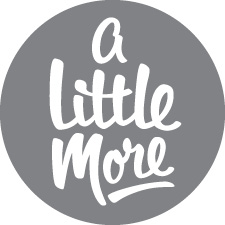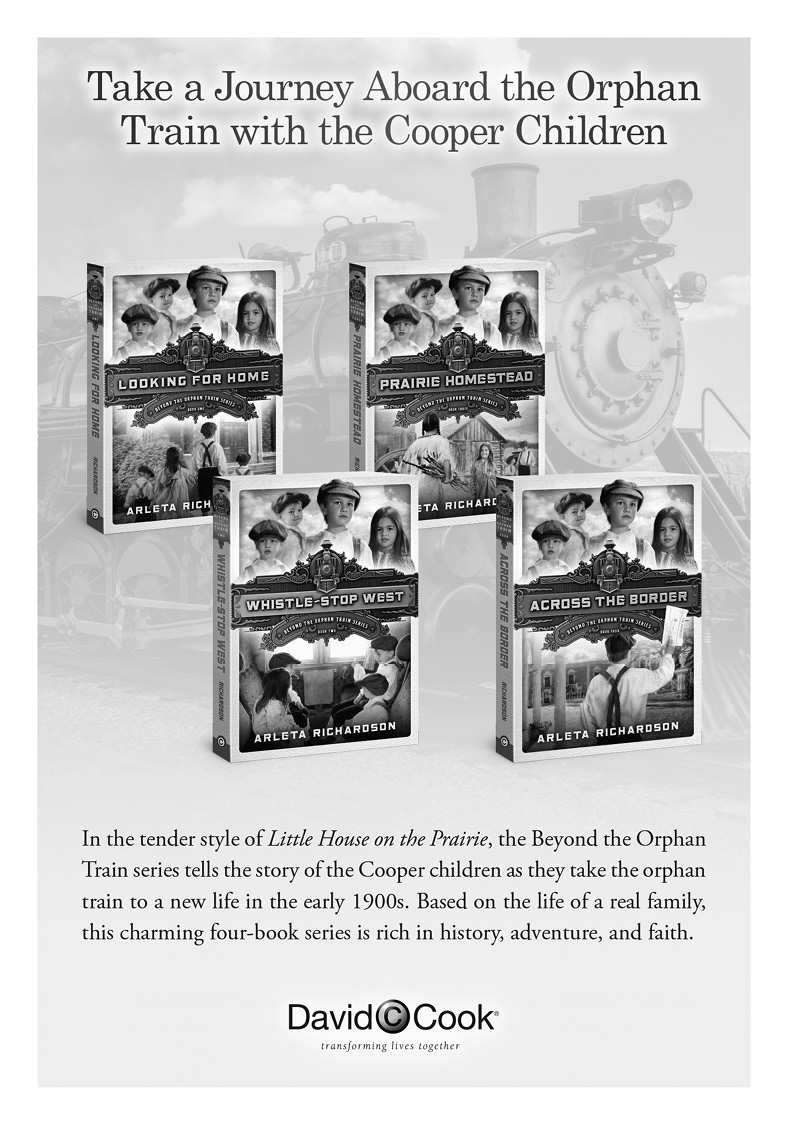Whistle-Stop West (13 page)
Authors: Arleta Richardson
Tags: #historical fiction for middle school;orphan train history;orphan train children;history books for children;historical fiction series


When a rockin' concert comes to an end,
the audience might cheer for an encore.
When a tasty meal comes to an end,
it's always nice to savor a bit of dessert.
When a great story comes to an end,
we think you may want to linger.
And so we offer â¦
⦠just a little something more after
you have finished a David C Cook novel.
We invite you to stay awhile in the story.
Thanks for reading!
Turn the page for â¦
⢠Author's Note
⢠Write, Talk, Imagine
⢠About the Author
⢠Other Books by Arleta Richardson
The year 1908 was an important one in the lives of the Cooper childrenâEthan, Alice, Simon, and Will. As soon as school was out, they moved from Briarlane Christian Children's Home in Pennsylvania to spend a short time at Hull-House in Chicago, Illinois, where they prepared for their journey west. Then they were put on an Orphan Train for a trip to Nebraska, their destination for a new home.
Twenty-five girls and boys, twelve from Briarlane and thirteen more joining them at Hull-House, traveled west under the care of Matron Daly and Agent Charles Glover. Ranging in age from three to fifteen, the children had very little in common. Some remembered no home but the orphanage. Others couldn't recall ever having lived in a building. A few remembered a mother or father in the past. Most had no recollection of anyone ever caring for them.
But there was one thing the children did share. As Charles Glover pointed out to Matron, “These children are survivors. If they couldn't make it almost anywhere, they wouldn't be here today.”
Still, even the hardiest survivor among them had some anxious thoughts about what lay ahead on this adventure. If a family in a small farming community chose a brother, a sister, or a friend, how would it feel to return to the train to go on to the next town? What if the people who took a boy or girl just wanted another farmhand or a maid rather than a son or daughter?
Every effort was made to place the children in suitable homes, and among the thousands of homeless youngsters who rode the Orphan Trains between 1854 and 1929, remarkably few experienced circumstances worse than the ones they had left. For the most part, midwestern farmers lived up to their reputation as “our most solid and intelligent class; possessed of a peculiar warmheartedness.”
Ethan, his brothers, his sister, and his friends all embarked on new lives that summer in 1908. They knew there would be good times and bad, happiness and sorrow, security and fearâbecause that's the way the world is. But God's grace, love, and mercy would also make the hard times easier and the easy times joyfulâbecause that's the way God is.
Write about It
Have you ever had to move to a new home or school, or say good-bye to a friend?
Saying good-bye to people you love is hard. When you feel lonely, how would the words Bert said to his best friend, Ethan, help? “They can see the same stars we can. It makes you think maybe we didn't leave them so far behind. When we get lonesome for each other, we can look at the sky.”
How could you “look at the sky” today ⦠and encourage others to do so too?
Shala has had a difficult life. Both her parents died, and she was placed in an orphanage. All she wants is a family of her own. Then, because Sheriff McCarty hears rumors about the Orphan Train “selling” children, Shala meets her real familyâher aunt and uncle. As Mrs. McCarty says, “The Lord knew. He turned something bad into good for us.”
When has God turned something bad into good for you and/or someone you love? Tell the story.
“I've worked with homeless children most of my life,” Matron says, “and I don't think there's a braver bunch anywhere to be found. I've tried to give all of them the hope that there is one Friend who will be with them no matter where they go.”
Who is the bravest person you know, and why? How might remembering that you have a Friend who is with you wherever you go help you be brave?
Talk about It
Ethan gives Bert his sketchbook before they part. Bert gives Ethan a chain with a key, the only thing he has of his father's.
If you were saying good-bye to your best friend, what item would you give that friend, and why?
Bert tells Ethan, “I suppose when I get my new home, I'll pretend I'm going back to the orphanage again to work with Otis on the farm. I wonder why we always want what we ain't got.” “I guess you like what you know better than what you don't know,” Ethan decided.
Do you think this is true? That we always want what we don't have? And that it's easier to stay with people we know and places we're used to than meeting new people or going new places? Explain.
“I don't know any people I don't like,” Ethan replied. “There's some I like better than others, but you can get to like anybody if you have to.”
Is it easy for you to like everybody? Why or why not? If you treated everyone as if you liked them, how might it be easier to make a friend?
Imagine It
Imagine you're Ethan, responsible for your two younger brothers and sister. You're riding the Orphan Train to meet your new family. You're not exactly sure where you're going, just that someone awaits you at the end of your journey. What questions, worries, and fears would you have about yourself? About your siblings?
Imagine you're Bert. How would you feel before you got off at each stop on the Orphan Train? Excited? Scared? Hoping this will be the time you find your family? How would you feel when your friendsâone after anotherâwere chosen, but not you?
Imagine you're riding on the Orphan Train. As Ethan said, “Pretend you could have anyone out there you wanted for your folks. Who would you pick?”
Bert said, “My pa would be dancin' a jig to make folks laugh.” What qualities would you hope for in a father or mother? Why are these things important to you?
Arleta Richardson grew up on the shores of Lake Michigan, loving the stories her grandmother told about her childhood on a nineteenth-century farm. In the popular Grandma's Attic series, Arleta retold those memories, capturing the hearts and imaginations of more than two million readers around the world.
Fascinated by the history of the Orphan Trains, Arleta based her Orphans' Journey series on the true account of a boy, named Ethan Cooper in the story, who rode the Orphan Train to a new life in 1908. The Orphan Trains operated between 1854 and 1929, relocating about 250,000 orphaned, abandoned, or homeless children.
The themes of Arleta's books reveal what was most important to herâfamily and friends, doing the right thing, overcoming fear during hard times, and working hard to see dreams fulfilled. She believed that God has a plan for each of us, and that His love and care will be revealed in His perfect timing.
The Grandma's Attic Series
In Grandma's Attic
More Stories from Grandma's Attic
Still More Stories from Grandma's Attic
Treasures from Grandma
Grandma's Attic Novels
Away from Home
A School of Her Own
Wedding Bells Ahead
At Home in North Branch
New Faces, New Friends

